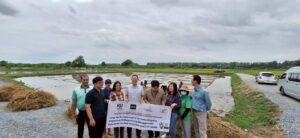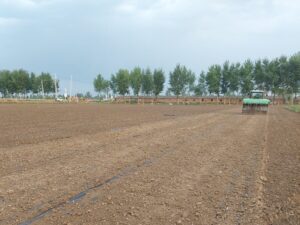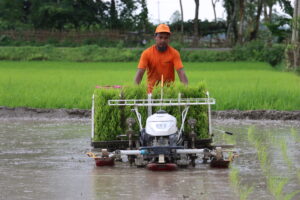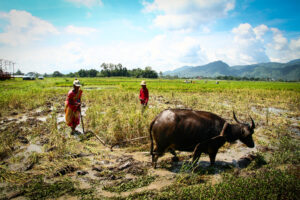LOS BAÑOS, Philippines – On a hot, breezy afternoon on 21 January 2016, an international gathering of agricultural scientists and development officials dedicated the Lloyd T. Evans Plant Growth Facility (PGF) on the campus of the International Rice Research Institute (IRRI). The opening of the USD 10 million state-of-the-art facility manifests IRRI’s commitment to better understand the effects of climate change on plant growth in the ongoing effort to achieve food and nutrition security for future generations across the globe.
The Australian government, through the Australian Centre for International Agricultural Research (ACIAR), a major partner of IRRI, funded the PGF named after Lloyd T. Evans (1927-2015), a world-renowned Australian plant physiologist who also served as a member of the IRRI board of trustees (1984-89).
During the dedication rites, IRRI Director General Matthew Morell said that, as a tax-paying Australian, he was happy to see his tax dollars put to excellent work. He added that the PGF will contribute greatly to IRRI’s plant breeding efforts, not only for irrigated rice, but also for the rainfed and unfavorable environments where the poorest and most underprivileged people live and where climate change will inflict its most dire effects. “It is not just a building for great science, but a building for great outcomes,” he predicted.
Special guests on hand for the dedication included Fernando Sanchez, Jr., chancellor of the University of the Philippines Los Baños (UPLB); Amanda Gorely, the new ambassador of Australia to the Philippines; Mellissa Wood, general manager of ACIAR’s global operations; and John R. Evans, head of the Division of Plant Sciences, Australian National University and son of Lloyd T. Evans.
Dr. Sanchez said he believes that the PGF will change the lives of generations of people worldwide. He added that the completion of the facility shows what cooperation and partnership can achieve. “IRRI has been a steady partner in many of UPLB’s agricultural and scientific endeavors,” he pointed out. “It is a partnership that has grown in importance as we have made headway in our efforts to achieve food security, not only in the Philippines, but in other areas of the developing world.”
Ambassador Gorley pointed out that, since 1983, Australia, through ACIAR, has provided significant assistance to the Philippines to support agricultural research aimed at achieving food security in the country. “The Australian government is acutely aware of the importance of rice for more than 3.5 billion people worldwide,” she said. “ACIAR and IRRI have worked closely on many projects over the years, such as the construction of the PGF, to reduce poverty through rice science.”
Ms. Wood said the research partnerships that ACIAR builds with organizations, such as IRRI, reflect not only Australian aid priorities and the country’s national research strengths, but also the agricultural priorities of developing country partners. “ACIAR encourages Australian scientists to use their skills for the benefit of developing countries and Australia,” she said. “It is a valuable outcome that I think is beautifully exemplified by Dr. Lloyd Evans himself.”
Dr. Evans, who followed in his father’s footsteps as a plant scientist, spoke on behalf of the Evans family. “It is a great honor and a real personal thrill to be invited to the opening of this facility,” he said. “When my father was a board member here at IRRI, he encouraged evidence- and research-based decision making rather than gut feelings passed on in a traditional way.” He said that the PGF will carry on this model as it enhances researchers’ ability to capitalize on the fantastic advances of molecular biology and genome sequencing.
| Abdel Ismail (left), acting IRRI deputy director general for research, takes visitors on an interior walking tour of the PGF. (Photo: Gene Hettel) |
After unveiling of the commemorative plaque, Abdelbagi Ismail, IRRI’s acting deputy director general for research, led guests and IRRI staff on a tour of the PGF, which contains eight controlled-environment glasshouses, a large set of controlled-environment walk-in and reach-in plant growth chambers, plant processing and potting laboratories, and a large seed processing and storage setup. It also features optimum environment-friendly management support systems that employ rainwater capture and storage, natural ventilation, and other energy-saving technologies.
Climate change is a concern that cuts across the various areas of IRRI’s research agenda. Knowing about its implications on rice production, via a better understanding of physiological processes and interactions in the rice plant when subjected to changing temperatures, humidity, amount of sunshine, and atmospheric gases, will help scientists develop even sturdier, climate-ready rice varieties and improved farming practices.
Educating the upcoming generation of future leaders in rice science is one of IRRI’s major strategic goals. It is thus hoped that the PGF’s cutting-edge array of scientific equipment will entice many bright graduates to build a career in the crop sciences.
| The dedication rites took place just one year after the official groundbreaking was held in January 2015. Watch the time lapse video covering the 12-month period. (Video by Isagani Serrano and Casper Gapuz) |
Learn more about IRRI (www.irri.org) or follow us on the social media and networks (all links down the right column).






